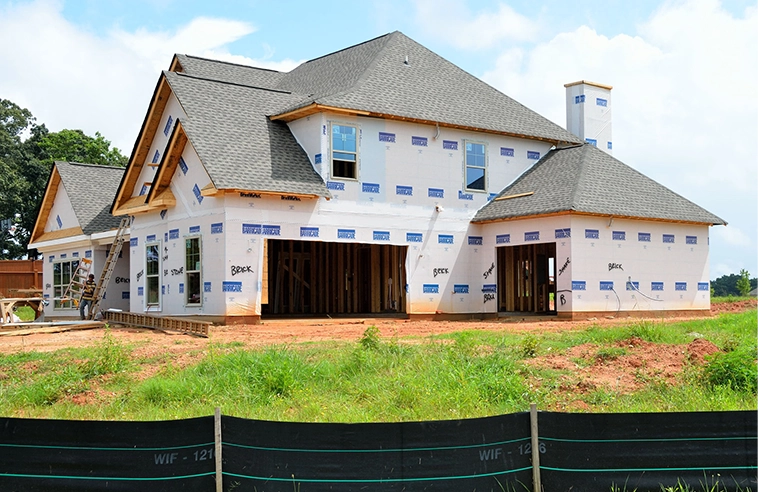What are the Different Types of New Construction Warranties?
Implied warranties
Instead of being explicit in a state’s laws, an implied warranty is one that is based on the legal precedent (i.e. prior court decisions) in that state. It may be made explicit, either in writing or orally, but it needn’t be made explicit in order to apply in a particular case. So even if a contract between a builder-vendor and a homebuyer doesn’t mention a warranty, an implied warranty may still apply.
Also, note that implied warranties may still apply even when there’s an additional explicit warranty.
Typical implied warranties on newly constructed homes are the warranty of good workmanship and the warranty of habitability.
Implied warranty of good workmanship
An implied warranty of good workmanship warrants that the newly constructed house or other dwelling (such as condominium apartment) meets reasonable standards of quality. That is, the construction work should be completed in a skillful manner, as a skilled craftsman should do it. Even if defects don’t impair habitability, if the quality of workmanship doesn’t meet reasonable standards, the builder may still be liable to repair the defects at no charge to the homeowner.
In many states, even if a contract between a builder-vendor and a homebuyer included phrases intended to disclaim the state’s implied warranty of good workmanship, this warranty would not be waived. Even in states where it’s permissible to waive this warranty, a clause in a contract describing the lower level of workmanship a homeowner would be agreeing to would have to be very explicit and conspicuous in order for the courts to honor it.
Implied warranty of habitability
An implied warranty of habitability means that a builder-vendor warrants that a new home is fit for human habitation. Even if it’s permissible in a particular state to waive this warranty, it would be difficult to do so. (Of course, builders of new homes aren’t looking to build structures that aren’t habitable!)
In some states, this warranty transfers to subsequent buyers of the house. This means that a builder could be responsible for addressing latent defects that render the house uninhabitable, but which were not detectable by a reasonably thorough inspection during the initial sale.
You can see how these implied warranties are open to a degree of interpretion. What counts as good quality workmanship? What counts as fit for human habitation or not? Since implied warranties are intended to protect buyers, when an issue is a matter of interpretation, courts often favor homeowners.
Express warranty
An express warranty is one that’s explicitly expressed, either verbally or in writing. Since verbal warranties can be very hard to prove in court, they’re usually written. In some circumstances, a builder may be required by law to provide an express warranty. But even when they’re not required by law, builders often choose to provide an express warranty for their newly constructed homes for a number of reasons. For example, they may choose to provide an express warranty because it
- Can be tailored to builders’ specific circumstances
- Provides homebuyers with peace of mind
- Eliminates ambiguity, reducing builders’ risk
- May explicitly disclaim implied warranties in some states
- Provides a point on which to negotiate with buyers
- Can specify homeowners’ responsibilities (e.g. when and how to make claim)
- Can include explicit details regarding dispute resolution
While it’s always recommended to get legal advice when drawing up warranties, note that it’s especially important to do so if a builder intends to disclaim implied warranties in their contract. If there is any ambiguity in the contract, or if a homebuyer claims they didn’t realize they were disclaiming an implied warranty, courts tend to rule in favor of the buyer. It’s much better to get legal advice so that ambiguity is avoided and any disclaimer is clear and conspicuous.
Statutory warranty
When warranty requirements are specified in a state’s statutes, a warranty is said to be statutory. Statutory warranties may be express warranties. For example, the Minnesota Statutes require builders (or other sellers of new homes) to expressly warrant the following in every contract for the sale of a dwelling:
- (a) during the one-year period from and after the warranty date the dwelling shall be free from defects caused by faulty workmanship and defective materials due to noncompliance with building standards;
- (b) during the two-year period from and after the warranty date, the dwelling shall be free from defects caused by faulty installation of plumbing, electrical, heating, and cooling systems due to noncompliance with building standards; and
- (c) during the ten-year period from and after the warranty date, the dwelling shall be free from major construction defects due to noncompliance with building standards.
Statutory warranties may also be implied. For example, in New York, the law states that the Housing Merchant Implied Warranty applies to all sales of new homes, even if it’s not explicitly written into contracts between builder-vendors and homebuyers.
If you’re just starting out as a builder, you may not know the legal requirements regarding warranties in your state. When you work with ProHome, you benefit from our legal experts’ knowledge and experience. You can be confident that your express warranty will meet your needs and be legally sound in your state.
DISCLAIMER: The information provided in this article does not, and is not intended to, constitute legal advice; instead, all information, content, and materials available in this article are for general informational purposes only. Readers of this article should contact their attorney to obtain advice with respect to any construction contract, warranty or particular legal matter. No reader of this article should act or refrain from acting on the basis of information on this site without first seeking legal advice from counsel in the relevant jurisdiction. Only your individual attorney can provide assurances that the information contained herein – and your interpretation of it – is applicable or appropriate to your particular situation. The views expressed in this article are those of the individual author writing in the author’s individual capacities only – not those of ProHome. The author is not an attorney or other legal expert. All liability with respect to actions taken or not taken based on the contents of this article are hereby expressly disclaimed by both ProHome and the author .*If you’d like to learn more about how home builder warranty management works or how developer warranty management works, check out this post: How builder’s warranty management works: What you need to know
If you’d like to learn more about construction warranty management with ProHome, give Matt a call at (316) 706-0368 or email him at matt@prohome.com.
If you know a builder who might find this post helpful, please share it. Zena Ryder is a freelance writer who writes about the construction industry. You can find her at Zena, Freelance Writer and on LinkedIn.




